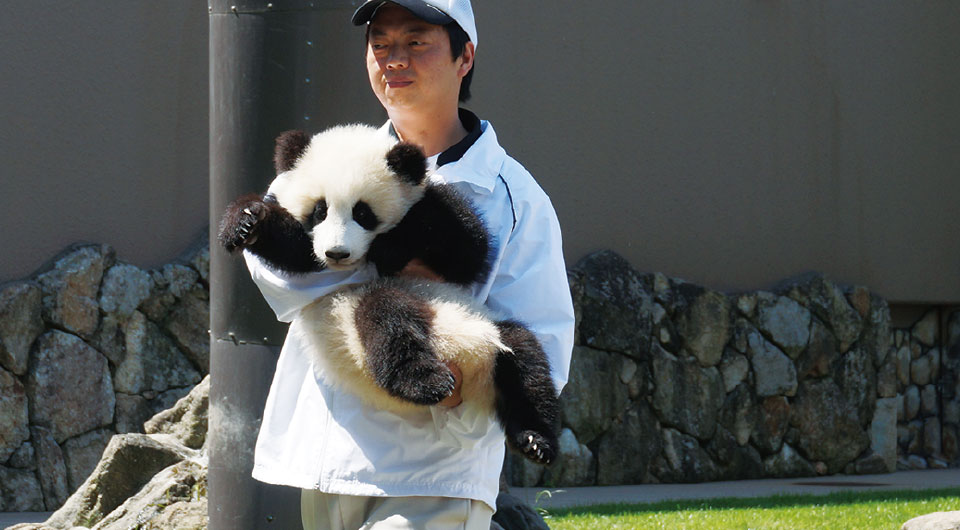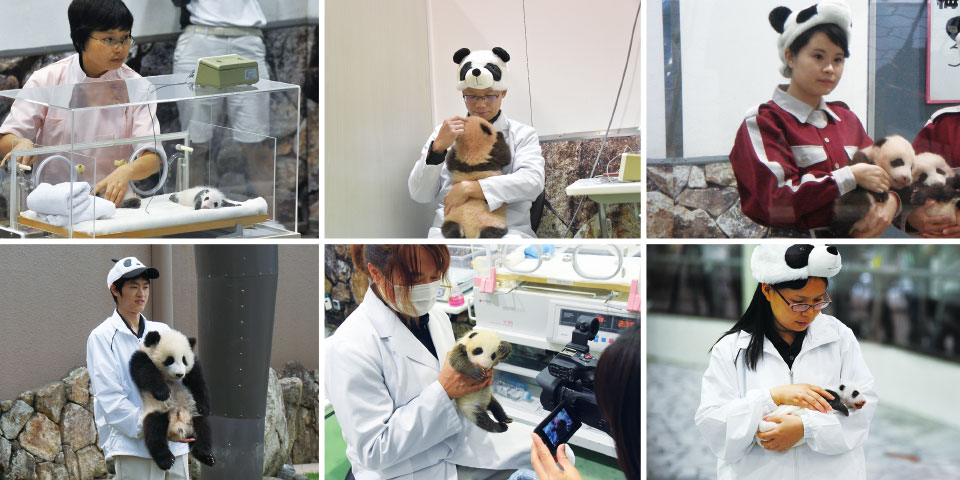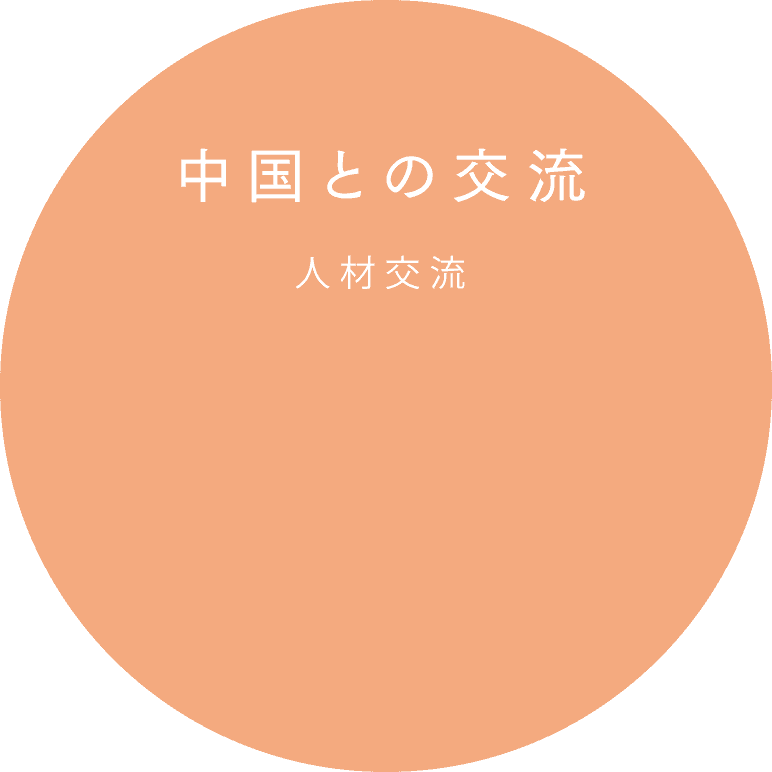

Not limited to breeding techniques, the program also proactively implemented food and cultural exchanges, building
Since 1994, we have had a total of over 70 Chinese staff members dispatched from the Chengdu Zoo and the Chengdu Giant Panda Breeding Research Base. In the beginning, the Chinese staff stayed with us throughout the year to manage the pandas under their guidance, and when breeding research began in earnest in 2000, experts in artificial insemination and newborn care came to Japan, giving our staff a variety of experiences. Since 2008, Chinese experts have visited Japan only during the mating and birthing seasons. In 2020, the Chinese experts will no longer be able to visit Japan during the estrus and calving season due to the difficulty of overseas travel caused by the Corona disaster, but our Park staff will be able to successfully conduct breeding and births based solely on the breeding and reproductive techniques we have developed over the years. However, based on the breeding and reproductive techniques we have cultivated over many years, we were able to successfully conduct breeding and births using only our Park staff. Our exchange with the Chengdu Giant Panda Breeding Research Base is not limited to breeding techniques, but also includes active exchange of food and culture, building a relationship of mutual trust.
In addition, the Park's staff has also visited the Chengdu Giant Panda Breeding and Research Station for training, first for a week in 1996 and then for a month in 2009. They mainly learned techniques essential for giant panda breeding and management, such as blood collection training, ultrasonic diagnosis, and methods of vaccination against infectious diseases, which they brought back to the Park. In 2019, we planned and implemented a 6-month long training program. The main purpose was to further exchange with experts at the Chengdu Giant Panda Breeding and Research Base and to establish a friendly relationship for future breeding research. However, due to the spread of a new type of coronavirus infection, the training had to be interrupted after three months and we had to return home. During the training, we were able to acquire various skills and knowledge, including health management of old individuals and total care of baby pandas.
Chinese Staff
| Period | Staff Name | |
|---|---|---|
| 1994年9月~1995年9月 | 宋 云芳 | 黄 祥明 |
| 1995年10月~1996年10月 | 王 强 | 江 华 |
| 1996年11月~1997年11月 | 余 健秋 | |
| 1996年11月~1997年5月 | 王 行亮 | |
| 1997年7月~1997年7月 | 王 强 | |
| 1997年8月~1997年11月 | 张 福祥 | |
| 1997年11月~1998年11月 | 费 立松 | 王 成东 |
| 1998年11月~1999年11月 | 牛 李丽 | 刘 选珍 |
| 1999年11月~2000年5月 | 赵 波 | 李 学兵 |
| 2000年5月~2000年12月 | 叶 志勇 | 吴 孔菊 |
| 2000年9月~2000年12月 | 左 红 |
|
| 2000年12月~2001年6月 | 余 星明 | 李 明喜 |
| 2001年6月~2001年12月 | 兰 景超 | 吕 文其 |
| 2001年11月~2002年5月 | 钟 顺隆 | 候 蓉 |
| 2001年12月~2002年3月 | 吴 尚菊 | |
| 2002年5月~2002年12月 | 杨 智 | 宋 雅芝 |
| 2002年12月~2003年6月 | 王 丽蓉 | 邓 家波 |
| 2003年9月~2003年12月 | 候 桂芳 | |
| 2003年9月~2004年3月 | 黄 祥明 | 余 星明 |
| 2004年3月~2004年9月 | 陈 红卫 | |
| 2004年3月~2004年10月 | 兰 景超 | |
| 2004年9月~2005年6月 | 刘 玉良 | 谢 桂蓉 |
| 2005年5月~2005年6月 | 王 基山 | |
| 2005年8月~2006年1月 | 陈 维刚 | |
| 2005年8月~2005年11月 | 杨 奎兴 | |
| 2005年12月~2006年3月 | 段 东琼 | |
| 2006年4月~2006年7月 | 兰 景超 | |
| 2006年4月~2006年10月 | 何 兴元 | 郑 涛 |
| 2006年8月~2006年10月 | 刘 玉良 | |
| 2006年11月~2007年5月 | 吕 文其 | |
| 2006年12月~2007年3月 | 陈 敏 | |
| 2006年12月~2007年8月 | 卿 太强 | |
| 2007年4月~2008年1月 | 兰 景超 | |
| 2007年8月~2008年2月 | 罗 娌 | |
| 2007年8月~2008年5月 | 吴 尚菊 | |
| 2008年3月~2008年5月 | 王 其山 | |
| 2008年8月~2008年11月 | 王 树群 | 杨 亚美 |
| 2008年11月~2009年2月 | 白 美蓉 | 李 佳 |
| 2010年3月~2010年4月 | 张 亮 | |
| 2010年8月~2010年11月 | 张 瑛 | 段 东琼 |
| 2010年11月~2011年2月 | 史 斌 | 刘 磊 |
| 2012年3月~2012年4月 | 王 海瑞 | |
| 2012年8月~2012年11月 | 何 平 | 梅 燕 |
| 2014年4月~2014年5月 | 蔡 志刚 | |
| 2014年11月~2015年2月 | 谢 意 | 杨 平 |
| 2015年3月~2015年6月 | 杨 奎兴 | 邱 德建 |
| 2016年3月~2016年6月 | 蔡 志刚 | |
| 2016年9月~2016年12月 | 李 翰 | 黄 河 |
| 2018年4月~2018年4月 | 蔡 志刚 | |
| 2018年8月~2018年10月 | 张 瑛 | 陈 娴 |
| 2020年12月~2021年2月 | 刘 红 | 熊 瑜 |
Training History
| Period | Main Training Contents |
|---|---|
| May 15 - 22, 1996 | Mastery of artificial insemination techniques |
| June 20 - July 20, 2009 | Mastery of treatment and training techniques and health management of older individuals |
| October 18, 2019 - January 21, 2020 | Health management of old individuals and mastery of total care for baby pandas |

